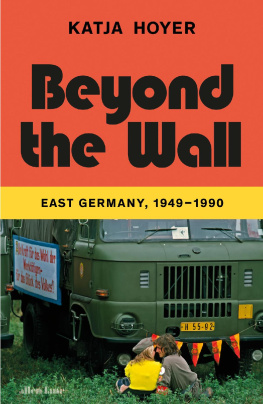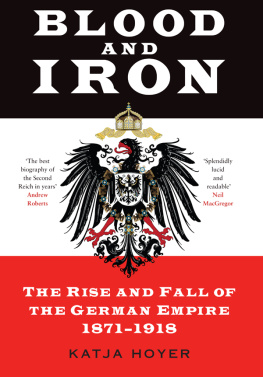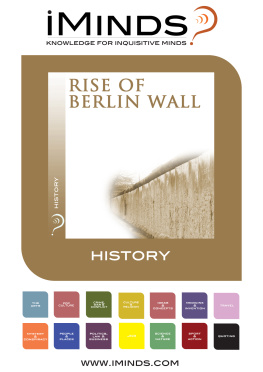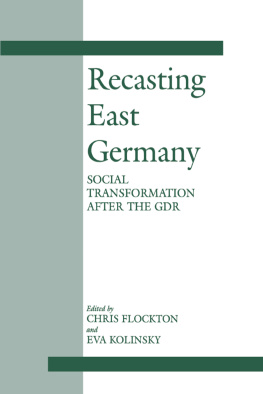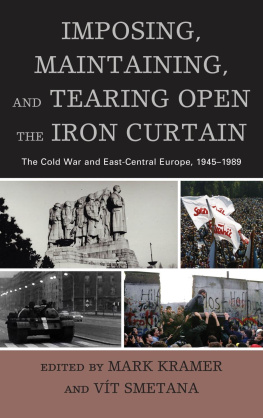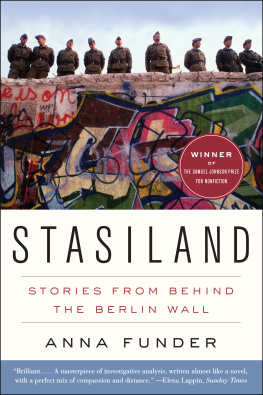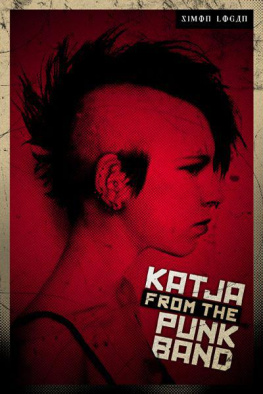Katja Hoyer - Beyond the Wall: East Germany, 1949-1990
Here you can read online Katja Hoyer - Beyond the Wall: East Germany, 1949-1990 full text of the book (entire story) in english for free. Download pdf and epub, get meaning, cover and reviews about this ebook. year: 2023, publisher: Penguin Books Limited, genre: Non-fiction. Description of the work, (preface) as well as reviews are available. Best literature library LitArk.com created for fans of good reading and offers a wide selection of genres:
Romance novel
Science fiction
Adventure
Detective
Science
History
Home and family
Prose
Art
Politics
Computer
Non-fiction
Religion
Business
Children
Humor
Choose a favorite category and find really read worthwhile books. Enjoy immersion in the world of imagination, feel the emotions of the characters or learn something new for yourself, make an fascinating discovery.
- Book:Beyond the Wall: East Germany, 1949-1990
- Author:
- Publisher:Penguin Books Limited
- Genre:
- Year:2023
- Rating:5 / 5
- Favourites:Add to favourites
- Your mark:
- 100
- 1
- 2
- 3
- 4
- 5
Beyond the Wall: East Germany, 1949-1990: summary, description and annotation
We offer to read an annotation, description, summary or preface (depends on what the author of the book "Beyond the Wall: East Germany, 1949-1990" wrote himself). If you haven't found the necessary information about the book — write in the comments, we will try to find it.
Katja Hoyer: author's other books
Who wrote Beyond the Wall: East Germany, 1949-1990? Find out the surname, the name of the author of the book and a list of all author's works by series.
Beyond the Wall: East Germany, 1949-1990 — read online for free the complete book (whole text) full work
Below is the text of the book, divided by pages. System saving the place of the last page read, allows you to conveniently read the book "Beyond the Wall: East Germany, 1949-1990" online for free, without having to search again every time where you left off. Put a bookmark, and you can go to the page where you finished reading at any time.
Font size:
Interval:
Bookmark:

About the Author
Katja Hoyer is a German-British historian, journalist and the author of the widely acclaimed Blood and Iron. A visiting Research Fellow at Kings College London and a Fellow of the Royal Historical Society, she is a columnist for the Washington Post and hosts the podcast The New Germany together with Oliver Moody. She was born in East Germany and is now based in the UK.
Katja Hoyer
BEYOND THE WALL:
East Germany, 19491990

Contents
In memory of Harry, the most faithful of companions, the most trusted of confidants, and always a calm refuge in hours of storm.List of Illustrations
Unter-den-Linden, Berlin, 3 June 1945: Courtesy of the Imperial War Museum. Rebuilding Berlin: Courtesy of The Berlin Cathedral.Eisenhttenstadt in the 1960s: Courtesy of the City Administration of Eisenhttenstadt / AKG images.Courtesy of Bundesstiftung Aufarbeitung. / Siegfried Gebser. / Klaus Morgenstern.Courtesy of Bundesstiftung Aufarbeitung. / Klaus Morgenstern. Labour Day, 1963: Courtesy of Axel Springer, Ullstein Bild.Courtesy of Bundesstiftung Aufarbeitung.Courtesy of Bundesstiftung Aufarbeitung. Elvis Presley fans, East Berlin, 1960: Courtesy of Archiv Robert Lebeck. Walter Ulbricht, 1955: Curtesy of Hulton Archive / Getty Images. Erich Hoenecker, 1976: Courtesy of Das Bundesarchiv. A Welder at Rostock Shipyard: Courtesy of Imago. At VEB Schwermaschinenbau Karl Liebknecht, Magdeburg: Courtesy of Imago. Break time at the VEB Elektrokohlefactory, East Berlin: Courtesy of Stiftung Deutsches Technikmuseum Berlin.. X World Festival of Youth and Students, 1973, East Berlin: Courtesy of Alamy. / Klaus Morgenstern. / Manfred Uhlenhut. Palace of the Republic, 1976: Courtesy of akg-images / Straube. Dresdens Socialist Reinvention, 1979: Courtesy of BEBUG mbH / Bild und Heimat, Berlin. / Klaus Fischer. A man shovelling coal from the street to his basement in Halle, February 1990: Courtesy of IMAGO / Rainer Unkel. Pioneers celebrating 25 years of Berlin Wall: Courtesy of Alamy. / Manfred Uhlenhut. Contract Worker from Mozambique, 1984: Courtesy of Das Bundesarchiv. Couple in the Oderbruch region: Courtesy of OSTKREUZ / Harald Hauswald.




Preface
Halle, Saxony-Anhalt, 3 October 2021. A sixty-four-year-old woman in a cream-coloured blazer and black trousers took to the stage. Perhaps the most powerful woman on earth, her image was instantly recognizable. Her trouser suits, blonde bob and matter-of-fact demeanour had become iconic. As she took her place between the flags of Germany and the European Union and adjusted the microphones on the lectern, many in the audience felt they were witnessing a historic moment. After sixteen years at the helm of Europes largest democracy, the outgoing German Chancellor Angela Merkel had come to speak about national unity.
3 October is the closest thing Germany has to a national day.
1990 was a watershed moment not just for the nation but for Merkel personally. It marked the beginning of her steep rise to the pinnacle of German politics. In 1954, when she was only three months old, her father had moved the family from West to East Germany. Merkel would spend the first thirty-five years of her life east of the inner-German divide. They saw her grow from pastors daughter to confident scientist and shaped her at least as much as the three decades since 1990.
Angela Merkels long career at the top of German politics stands testament to the many successes of reunification. When the East German state that had been her home suddenly disintegrated and became part of the West German system it had opposed for so long, Merkel hit the ground running without looking back. Or at least without doing so in public. She understood that on paper her East German background was a political asset in a country that wanted to show it was now a united nation. But in reality that was true only so long as it remained her background rather than her identity. The establishment didnt want a constant reminder that the wall in East and West German minds would take longer to tear down than the physical one.
On the rare occasions when Merkel revealed details of her life in the GDR, this was met with hostility in the circles of power that are still largely dominated by former West Germans.
While Merkel had resigned herself to keeping a tight lid on her East German past, it remained a part of her she could not relinquish.
Merkels frustration with the way her early life in East Germany is still dismissed as irrelevant is shared by many of her fellow former GDR citizens. After sixteen years in the highest political office of the land, this East German still had to prove her allegiance, disavowing what came before.
Just as individual East Germans are asked to minimize traces of their pre-1990 past, the nation as a whole seems supremely uncomfortable with the GDR as a chapter of its history. In many ways, the process of writing the GDR out of the national narrative began even before its final demise. In 1989, after the fall of the Berlin Wall, the former West German Chancellor Willy Brandt famously declared, Now what belongs together will grow together. For many Germans, East and West, the division of their country, which had seemed a fact of life during the Cold War, now looked like an unnatural state of affairs, a product of the Second World War and perhaps a punishment for it. By 1990, had Germany not done enough to overcome this dark chapter of its past? Did it not deserve a fresh start without constant reminders of it? Francis Fukuyamas framing of the end of the Cold War as the end of history seemed particularly apt for Germany. The nation wanted, indeed needed to see reunification as a happy ending to its tumultuous twentieth century. Acknowledging the continuing impact of Germanys decades of division as anything other than distant history destroys this comforting illusion. If the GDR is to be remembered at all, then it is as one of Germanys dictatorships as remote, sinister and irredeemable as Nazism.
Drawing a line under both German states and seeing 1990 as a fresh start for all Germans was also out of the question. West Germans had grown too fond of the idea of 1945 as their zero hour, the point from which the tender shoots of democracy were growing out of the ashes of the Second World War. Whatever problems the infant Federal Republic may have had, the prosperity and stability it had produced were like a comfort blanket to a population that had known little but tumult since 1914. Here was a Germany to be proud of. West Germany was declared the continuity state and East Germany the anomaly. Reunification in 1990 therefore seemed a satisfying end to forced separation. And to many East Germans too it was just that. In 1989 and 1990, many voted for the dissolution of their country in both word and deed.
Next pageFont size:
Interval:
Bookmark:
Similar books «Beyond the Wall: East Germany, 1949-1990»
Look at similar books to Beyond the Wall: East Germany, 1949-1990. We have selected literature similar in name and meaning in the hope of providing readers with more options to find new, interesting, not yet read works.
Discussion, reviews of the book Beyond the Wall: East Germany, 1949-1990 and just readers' own opinions. Leave your comments, write what you think about the work, its meaning or the main characters. Specify what exactly you liked and what you didn't like, and why you think so.

